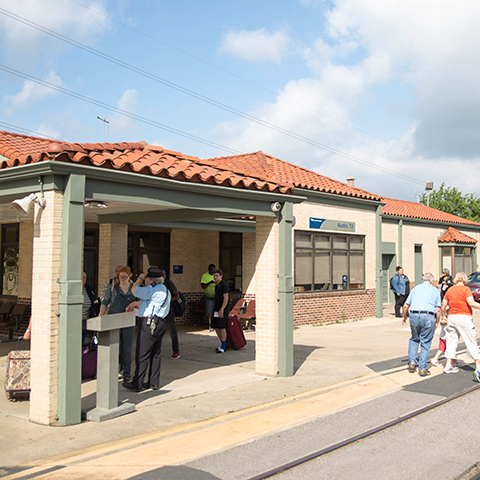Austin, TX (AUS)
The brick depot was built in 1947 for the Missouri Pacific Railroad. Austin, a center of high-tech industry as well as the state capital, also styles itself the “Live Music Capital of the World.”

250 North Lamar Boulevard
Austin, TX 78703
Annual Station Ridership (FY 2024): 39,695
- Facility Ownership: Union Pacific Railroad
- Parking Lot Ownership: Union Pacific Railroad
- Platform Ownership: Union Pacific Railroad
- Track Ownership: Union Pacific Railroad
Todd Stennis
Regional Contact
governmentaffairsnol@amtrak.com
For information about Amtrak fares and schedules, please visit Amtrak.com or call 1-800-USA-RAIL (1-800-872-7245).
Austin’s brick station, built in 1947 for the Missouri Pacific Railroad, provides a small waiting room, ticket office and restroom for passengers.
The Houston and Texas Central Railroad came to Austin in 1871, with its main tracks on Pine (now Fifth) Street. The stone Old Depot Hotel built by Carl Schaeffer with architect Abner Cook was Austin’s and the state’s first railroad station and was operational from 1871 to 1872. Known as Railroad House, it still stands on 5th Street and houses Carmelo’s Italian Restaurant. At the time it was built, it accommodated passengers traveling to other railroads and four stagecoach lines. This building was placed on the Texas State Historical Survey.
The other two signature depots which once served Austin stood opposite each other at Congress Avenue and Third Street; about four blocks away from Railroad House and have both have been razed. The buff brick International & Great Northern (later Missouri Pacific) station, with its distinctive round turret, was built in 1881, and the red brick Houston and Texas Central Railroad (later Southern Pacific) was built in 1902. During its heyday, in the 1920s, 18 trains a day would come through the tracks on Third Street.
Austin’s first documented non-Native settlement came in 1835, when English-speaking Americans began arriving in the area and founded the village of Waterloo on the bank of the Colorado River. According to local folklore, Stephen F. Austin, the “father of Texas,” negotiated a boundary treaty with the local Native Americans at Treaty Oak. This tree, the last of the 24 Comanche Council Oaks, is estimated to be 500 years old, and still stands in the city.
In 1838, Mirabeau Lamar and a band of Texas Rangers visited Waterloo, and favorably impressed, submitted the town as the site for the capital of the Republic of Texas after he was elected its third president. The choice met with much controversy, particularly resistance from Sam Houston, who felt it was tactically insecure, but in 1839, Lamar dispatched a team of surveyors from Houston to set up a grid for the new city, to be named for Stephen Austin, and also set aside land for a university within the city. In 1842, Austin almost lost its status as capital during the Texas Archive War. In the dead of night on December 29, 1842, a group of men were sent to take the archives of Texas from Austin to Washington-on-the-Brazos. Austin residents responded to the threat by forcibly keeping the national archives in their city, in defiance of President Houston’s attempts to remove them. Angelina Eberly fired a cannon at the men, who made their escape, only to be caught by another group of men who returned the archives to Austin.
Texas joined the Union in 1845, and was part of the Confederacy during the American Civil War. It was occupied, afterward, by a federal garrison led by General George Custer. On Christmas Day 1871, the first train arrived in downtown Austin to great celebration. A decade-long building and population boom followed, as Austin became a mercantile and shipping center for Central Texas. In 1882, construction began on the University of Texas campus.
Austin today, a center of high-tech industry as well as the state capital, also styles itself the “Live Music Capital of the World.” The city’s musical heritage began in 1933 when Threadgill’s North, a venue that later hosted renown artists such as Janis Joplin, first opened its doors. The list of performers that have been on stage in Austin includes greats of the big band era, jazz, blues, country, rock, punk, and onward. Many know of the PBS live music show, Austin City Limits, which has hosted over 500 bands since its inception in 1976. Austin is also home to a number of musical festivals, including South by Southwest, the Austin City Limit Music Festival, Carnival Brasileiro, Eeyore’s Birthday Party, First Night Austin, and Batfest.
The Ann W. Richards Congress Avenue Bridge houses the world’s largest urban population of Mexican free-tailed bats. Starting in late February, up to 1.5 million bats take up residence inside the bridge’s expansion and contraction zones as well as in long horizontal grooves running the length of the bridge’s underside, an environment ideally suited for raising their young. Every evening around sunset, the bats emerge in search of insects, an exit visible on weather radar that darkens the skies over the bridge. Watching the bat emergence is an event that is popular with locals and tourists, with more than 100,000 viewers per year. The bats migrate to Mexico each winter.
Station Building (with waiting room)
Features
- ATM not available
- No elevator
- No payphones
- No Quik-Trak kiosks
- Restrooms
- Ticket sales office
- Unaccompanied child travel allowed
- Vending machines
- No WiFi
- Arrive at least 45 minutes prior to departure if you're checking baggage or need ticketing/passenger assistance
- Arrive at least 30 minutes prior to departure if you're not checking baggage or don't need assistance
Baggage
- Amtrak Express shipping not available
- Checked baggage service available
- No checked baggage storage
- Bike boxes for sale
- Baggage carts available
- Ski bags not available
- Bag storage with Fee
- Shipping Boxes for sale
- Baggage assistance provided by
Parking
- Same-day parking is available; fees may apply
- Overnight parking is available; fees may apply
Accessibility
- No payphones
- Accessible platform
- Accessible restrooms
- Accessible ticket office
- Accessible waiting room
- Accessible water fountain
- Same-day, accessible parking is available; fees may apply
- Overnight, accessible parking is available; fees may apply
- No high platform
- Wheelchair available
- Wheelchair lift available
Hours
Station Waiting Room Hours
| Mon | 09:00 am - 07:00 pm |
| Tue | 09:00 am - 07:00 pm |
| Wed | 09:00 am - 07:00 pm |
| Thu | 09:00 am - 07:00 pm |
| Fri | 09:00 am - 07:00 pm |
| Sat | 09:00 am - 07:00 pm |
| Sun | 09:00 am - 07:00 pm |
Ticket Office Hours
| Mon | 09:00 am - 07:00 pm |
| Tue | 09:00 am - 07:00 pm |
| Wed | 09:00 am - 07:00 pm |
| Thu | 09:00 am - 07:00 pm |
| Fri | 09:00 am - 07:00 pm |
| Sat | 09:00 am - 07:00 pm |
| Sun | 09:00 am - 07:00 pm |
Passenger Assistance Hours
| Mon | 09:00 am - 07:00 pm |
| Tue | 09:00 am - 07:00 pm |
| Wed | 09:00 am - 07:00 pm |
| Thu | 09:00 am - 07:00 pm |
| Fri | 09:00 am - 07:00 pm |
| Sat | 09:00 am - 07:00 pm |
| Sun | 09:00 am - 07:00 pm |
Checked Baggage Service
| Mon | 09:00 am - 07:00 pm |
| Tue | 09:00 am - 07:00 pm |
| Wed | 09:00 am - 07:00 pm |
| Thu | 09:00 am - 07:00 pm |
| Fri | 09:00 am - 07:00 pm |
| Sat | 09:00 am - 07:00 pm |
| Sun | 09:00 am - 07:00 pm |
Parking Hours
| Mon | 24 HOURS |
| Tue | 24 HOURS |
| Wed | 24 HOURS |
| Thu | 24 HOURS |
| Fri | 24 HOURS |
| Sat | 24 HOURS |
| Sun | 24 HOURS |
Quik-Track Kiosk Hours
Lounge Hours
Amtrak Express Hours
| Mon | CLOSED |
| Tue | CLOSED |
| Wed | CLOSED |
| Thu | CLOSED |
| Fri | CLOSED |
| Sat | CLOSED |
| Sun | CLOSED |


 Amtrak established the Great American Stations Project in 2006 to educate communities on the benefits of redeveloping train stations, offer tools to community leaders to preserve their stations, and provide the appropriate Amtrak resources.
Amtrak established the Great American Stations Project in 2006 to educate communities on the benefits of redeveloping train stations, offer tools to community leaders to preserve their stations, and provide the appropriate Amtrak resources. Amtrak is seizing a once-in-a-lifetime opportunity to transform rail and Retrain Travel. By modernizing, enhancing and expanding trains, stations and infrastructure, Amtrak is meeting the rising demand for train travel. Amtrak offers unforgettable experiences to more than 500 destinations across 46 states and parts of Canada. Learn more at
Amtrak is seizing a once-in-a-lifetime opportunity to transform rail and Retrain Travel. By modernizing, enhancing and expanding trains, stations and infrastructure, Amtrak is meeting the rising demand for train travel. Amtrak offers unforgettable experiences to more than 500 destinations across 46 states and parts of Canada. Learn more at